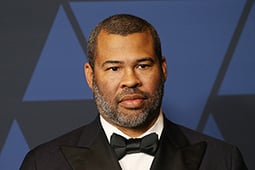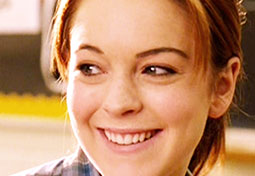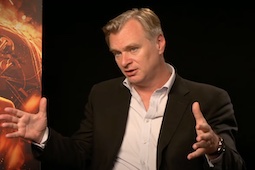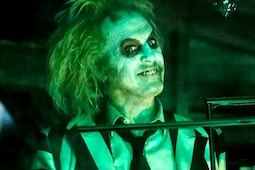
Who could resist the opportunity to watch an era-defining eighties classic back on the big screen at Cineworld? We're talking about Do the Right Thing, director Spike Lee's incendiary drama that's showing as part of Black History Month and the 50th anniversary of hip-hop.
With the movie now more relevant than it ever was, here's how it put Spike Lee on the moviemaking map. The following reasons should be more than enough for you to clear your schedule and make a date with Lee's movie at Cineworld this October.
1. It expertly balances humour and horror
As a filmmaker, Spike Lee revels in the dramatic possibilities of contradiction. Take his recent Oscar-winning success BlacKkKlansman (2018) as an example. The movie is both amusingly farcical in its nature, loosely adapting the true story of an African-American police officer who brazenly fooled the high-ranking officials of the Ku Klux Klan, and deeply serious. The movie's sober streak is elicited through several tense and hard-hitting set-pieces that touch variously on police harassment and systemic racism ingrained in contemporary American culture.
Those very same contradictory principles inform the complex and knotty fabric of Do the Right Thing. It occupies one especially scorching day in a Brooklyn neighbourhood as tensions between the disparate African-American, Italian-American, Puerto Rican and Korean factions come to a head at the local fixture, Sal's Pizzeria. Even at this relatively nascent stage of his career, Lee is able to mine his difficult material for both outrage and outrageous laughs – take the stereotypes scene, for instance, a fine example of breaking the fourth wall and making the audience complicit in the movie's subject matter.
Alongside the material that's played for humorous effect, the movie's horrific conclusion, involving violence, death and arson, compels the viewer to ask the most thorny question of all. Which character actually does the right thing? Is it even possible to do the right thing? Lee's accomplished movie is roaringly entertaining in the moment and yet also has the power to linger in the mind with its disquieting observations, which have only become more trenchant over time.
2. It speaks with authority about the echo chamber nature of racism
The subjectivity of racism is a hellish and controversial subject capable of taking down even the most experienced of filmmakers. Lee, in what was just his third feature film, makes it look effortless as he speaks with calm authority from within the Brooklyn neighborhood that he evidently knows so well. The most important thing Lee nails is the inherent subjectivity of racism: each culture harbours specific prejudices and slurs that are projected onto those who are perceived as 'different'.
It's essentially a walled-off, echo chamber effect of hatred, which has a cyclical effect of inflaming suspicion and terror that eventually boils over at Sal's. In Lee's world, nobody does the right thing and everybody is capable of crossing the line, even those like Lee's own character Mookie whom we take as the central protagonist. Mookie attempts to act as the compassionate mediator between the mercurial Sal (Oscar nominee Danny Aeillo) and the pressure cooker influences of outside individuals like the volatile Buggin' Out (Giancarlo Esposito).
And yet, ironically, Mookie's decisive actions in the climax are the ones that most blur the lines between good and bad. In moments such as this, the movie cements itself as an uncannily perceptive statement on human nature and impulse.
3. There's a vivid cast of newcomers and established actors
Quite apart from the resonant themes, the movie is a joyous blast of energy thanks to Lee's sharp script and an on-point cast. Rewatching the movie reveals a who's-who of late eighties newcomers who hit the A-list not long after. The pivotal character of Tina is seen shadow-boxing to the sound of Public Enemy's 'Fight the Power' (more on which below) – she's played by Rosie Perez who would later be Oscar-nominated for Peter Weir drama Fearless.
Bill Nunn, later to be seen in Sister Act and Spider-Man, makes an impact as the boombox-wielding Radio Raheem whose actions inflame the movie's climax. John Turturro, later to become a regular with the Coen brothers, plays Sal's racist son Pino. There's even a brief appearance from a young Martin Lawrence. The youthful contingent acts as a contrast with the more experienced performers including Danny Aeillo, giving a career-best turn as the imploding Sal, Ossie Davis, as Da Mayor, and Ruby Dee as Mother Sister. (Davis and Dee were married in real life, which gives their scenes an added humorous charge).
It's a terrific ensemble, and all of the actors bring conviction and timing to their parts. Even a young Samuel L. Jackson is present as our substitute for a Greek Chorus: he portrays DJ and commentator Señor Love Daddy who observes the melting pot of tension as it heats up.
4. The soundtrack defined a generation
Do the Right Thing is a fitting movie to re-release as hip-hop hits its fifth decade. The movie's striking use of music crosses both the dietetic and ex-diegetic fields to dynamic effect – in other words, sometimes the source of the movie is visible within the scene (a la Radio Raheem's boom box) and other times it deploys an externalised film score to implicitly comment on the action.
The soundtrack is anchored by Public Enemy's 'Fight the Power', which was commissioned specifically by Spike Lee for the movie. The song becomes the film's de facto theme, a pulsating call to arms that Radio Raheem blasts out at every opportunity. Even the song itself has ironic connotations – the track's deliberately provocative nature can be said to make the situation worse, as in the final confrontation at Sal's, yet at the same time it defines a sense of wider cultural identity. The song ultimately acts as something of a rallying point for the likes of Radio Raheem and Buggin' Out.
Off-screen, 'Fight the Power' rocketed to the number one spot on the Hot Rap Singles chart and came to act as the voice of a dispossessed generation. It was also named the best single of 1989 by The Village Voice in their Pazz & Jop critics' poll. And in 2021, the song was ranked number two in Rolling Stone's 500 Greatest Songs of All Time list.
Away from that, there's a seductively smooth score composed by Lee's own father Bill. The velvety yet subtle trumpets allude to the history of jazz, again underscoring the sense of identity sought by the film's African-American characters. Like the script and the direction, the movie's use of music is multifaceted and capable of catching a viewer off-guard with fresh nuances at every turn.
5. All of Spike Lee's subsequent movies took their DNA from this one
All of the above facets secured Spike Lee as an exciting new voice in the world of socio-political Hollywood filmmaking. He would later translate the same unpredictable sense of jazzy energy into the likes of Mo Better Blues (1990), Lee's first collaboration with Denzel Washington. Lee then corralled and harnessed all of his abilities for 1992's seminal Malcolm X, which distills and builds on Do the Right Thing's captivating racial ironies to build a sweeping, four-hour account of the traumas of black America.
Washington's Oscar-nominated performance as the titular leader Malcolm X is arguably the high point of his collaboration with Lee. They would later work on the punky basketball drama He Got Game (1998) and the relatively more streamlined bank heist thriller Inside Out (2006). Lee's ability to speak with authority about the black experience, leavened with his love of genre and visual storytelling, has criss-crossed the world of crime movies (1995's Clockers) and documentaries (1997's devastating Four Little Girls).
Lee's recent high point is the aforementioned BlacKkKlansman, which won him his first Oscar (for Best Adapted Screenplay). Yet for all the film's success, and those before it, Lee has rarely topped the success of Do the Right Thing. It's a movie that feels holistic and wholly complete, successful in both its ironically humorous worldview and its sincere desire to make the world a better place.
It's time to fight the powers that be and re-engage with a seminal work of cinema. Click the link below to book your tickets for Do the Right Thing, which screens on October 10th.











.jpg)


.jpg)
.png)






